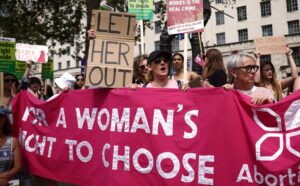Ever since the Dobbs decision redefined the reproductive rights of American women, the issue of choice has started to resemble a frantic game of ping-pong. In red states, Republican-controlled senates immediately got busy passing abortion bans, sometimes in direct opposition to their own constituents. In blue states, Democratic governors announced increased abortion protections as well as anti-extradition statutes to protect women who travel from red states to have the procedure done. No doubt these statutes will prove salient, as will the ongoing battle over the deregulation of the abortion pill: in states such as Texas, where abortion past six weeks of pregnancy is now banned, virtually every abortion clinic has closed.
Meanwhile, it’s an election year, and pro-choice advocates hope to put abortion protection on the ballot in nine states — causing panic on the Right, since these measures tend to pass with overwhelming voter support. For Democrats, all signs point to this being the defining issue of the 2024 election. “President Biden and Vice President Harris believe health care decisions should be made by women and their doctors, not politicians. Period,” the White House posted this week, throwing down the first of what will no doubt be several gauntlets.
The current administration’s abortion strategy hinges on Kamala Harris, who is currently touring the country to highlight Biden’s commitment to women’s reproductive rights: on her first stop, she was photographed in front of a giant sign that read, simply, “TRUST WOMEN”. It’s an effective slogan, but also a provocative one, when even the activists who would grant the procedure sacred status don’t seem to entirely trust women to know our bodies, and accept the consequences of our choices.
In a world that simply trusted women, abortion itself would be less common, I think, because more trust equals more empowerment and therefore fewer limitations: women would be free to obtain birth control at low cost and without a prescription, a key issue that has been somewhat overlooked amid the heated battles over abortion. Add some straightforward sex education that teaches women from an early age how fertility works — as opposed to the fearmongering version in which pregnancy can happen anytime, anywhere, just from being in the same room as a sperm — and you would get an informed, empowered population capable of avoiding unintended pregnancies.
Beyond that, the rules would be simple: a woman who wanted an abortion could obtain one within reasonable limits — guided by a scientific understanding of viability, perhaps. And, with the usual caveats — foetal abnormalities, for instance, or a threat to the mother’s life — a woman who sought an elective abortion outside the prescribed window would be in violation of… well, something. If not the law, then the social contract.
The question of just what consequences a woman could or should face for flouting abortion restrictions has always been a thorny one. Any attempts to enforce such statutes can result in innocent women being investigated for a crime after their wanted pregnancies ended in miscarriage — but even in unambiguous cases, society is at odds with itself about just who to punish and how. Two things are true: that most people support laws limiting abortion beyond the first trimester, and that most people are uncomfortable with the idea of holding women accountable for breaking those laws. (Partly for this reason, medics in the UK have recently been advised not to report women suspected of having an illegal abortion to the police.)
It’s a conundrum: a society that truly trusts women would also trust them to follow the rules or face the consequences. But then, we have always struggled with this, too. We like the idea of empowering women, but holding them accountable for abusing that power? Not so much.
It seems to me that in the abortion wars, neither side is willing to trust women — to see them as fully human, fully adult, fully capable of reckoning with the implications of the choice to terminate a pregnancy. Each in their own way would deprive women of agency, if not by stopping them from making the choice, then by never holding them accountable for it. At the root is a shared conviction that women cannot control themselves, a safetyist impulse aptly described by David Brooks in a recent column about the administrators who increasingly rule over every aspect of American life: “The whole administrative apparatus comes with an implied view of human nature,” he writes. “People are weak, fragile, vulnerable and kind of stupid. They need administrators to run their lives.”
Within the parameters of the debate over abortion rights, you could argue that both sides appear to agree that women are fragile. Much has been written about the horrors of the pre-Roe era; we know the deadly consequences of a world where women cannot safely and legally abort, and we have long scorned the callous politicians who chuckle that the best solution to unintended pregnancy is for women to just stop having sex, you sluts. Less discussed is what the pro-choice side telegraphs about its view of women, when it argues that they must not only be allowed to choose, but to have their options open indefinitely, no restrictions, no limitations.
Academics sniff at the notion that elective abortion should be disallowed after a certain point, decrying the entire concept of foetal viability as “overly moralistic”; the Guttmacher Institute insists that gestational age bans are harmful, full stop, and that abortion should be available to women “on the timeline that meets their needs”. Journalists sombrely report on the troubling implications of the prosecution of a Nebraska teenager who ended her pregnancy with mifepristone — waiting until the 23rd paragraph to mention the relevant and fairly shocking information that she was 30 weeks pregnant at the time.
These arguments lack the spectacular misogyny of the pro-life crowd’s shrieking about sluts, but they are still patronising to women. The implication is that a woman cannot be expected to make up her mind about whether she wants to have a baby within a certain timeframe, nor wrestle with difficult questions about what consideration, if any, the foetus growing inside her deserves. In this we might hear echoes of the old arguments used to control women: that we are fickle, hapless creatures who know little of our own biology and even less of our own minds.
Of course, it’s become fashionable to speak of women and our bodies this way: in terms of fragility. Our ancestors, on the other hand, recognised that the ability to bear children gives women immense power. In the ancient world, abortion was restricted less as a means of protecting women than to protect other people from them. A woman who terminated her pregnancy deprived her husband of an heir, and her crime was not murder, but a sort of theft; she had shaped his future, his legacy, in ways he could not control. The property and inheritance laws that made a woman’s survival dependent on producing children — specifically a son — were, among other things, a way of subverting whatever power might have come from being the one with a womb.
This makes for an ironic comparison with the contemporary narrative that women are in desperate need of protection — at a moment when we enjoy greater control over our reproductive abilities, and less stigma for exercising it, than we have ever before. For all that we seek to defend women from having to carry an unwanted pregnancy to term, we still struggle with the raw exercise of power inherent in choosing to end one, or the possibility that with that power comes a certain amount of social responsibility.
When I was four, a tiny mole scurried out of a hole beside me while I was playing in the garden. It startled me, and I brought my foot down instinctively; I didn’t mean to kill it, but I did. My mother made me bury it, and while I did, she told me she knew I hadn’t meant to, but that it didn’t matter. That in a world populated by creatures smaller and more fragile than you, you are accountable for where you choose to step.
I think about this sometimes — when people scoff that an abortion is nothing, just a bundle of cells, or when I see a woman holding a sign that says, “MY ABORTION WAS FABULOUS”. A mole doesn’t have hopes or dreams; a blastocyst has no sense of itself. If these are arguably lives, they are not especially significant ones, and perhaps this makes it easy to be cavalier: you are not ending so much, when you destroy them. You might even begin to imagine your choices carry no weight at all.
And yet… “fabulous”?
I don’t expect much reckoning with these questions in the coming year, or ever, necessarily. Amid the urgency and tumult of the post-Dobbs landscape, several things are true: that abortion must remain legal, that every attempt to restrict it inevitably inflicts far worse harm than it manages to prevent, and that if the Democrats are smart, they’ll spend the next 10 months making sure there’s not a person in the country who hasn’t heard about the unimaginable horrors that have followed the draconian abortion bans in Texas and elsewhere.
But this is a way to win elections, not to illuminate the truth: that the instincts of pro-life and pro-choice alike are too often infantilising to women, and that trusting women requires abandoning the pretence that they need to be protected. Safetyism and equality are mutually exclusive: we must insist on women’s absolute right to choose when or whether to be pregnant, even when that choice intersects with some of the most complex moral questions of all time. At the same time, we must also stop pretending that pregnancy does not carry with it a unique and potent strength. Only a woman can bring forth a whole new person from inside her body — and only a woman can choose not to, reaching over the Fates’ shoulder to snatch those first slim threads of life back through the needle’s eye.
The history of abortion restrictions is a history of men trying to undermine this power, because they are terrified by it, and they should be. It is enormous. It is unfathomable. And like all power, it isn’t without its burdens. But it is ours, whether it’s politically expedient to admit this or not.
Disclaimer
Some of the posts we share are controversial and we do not necessarily agree with them in the whole extend. Sometimes we agree with the content or part of it but we do not agree with the narration or language. Nevertheless we find them somehow interesting, valuable and/or informative or we share them, because we strongly believe in freedom of speech, free press and journalism. We strongly encourage you to have a critical approach to all the content, do your own research and analysis to build your own opinion.
We would be glad to have your feedback.
Source: UnHerd Read the original article here: https://unherd.com/





